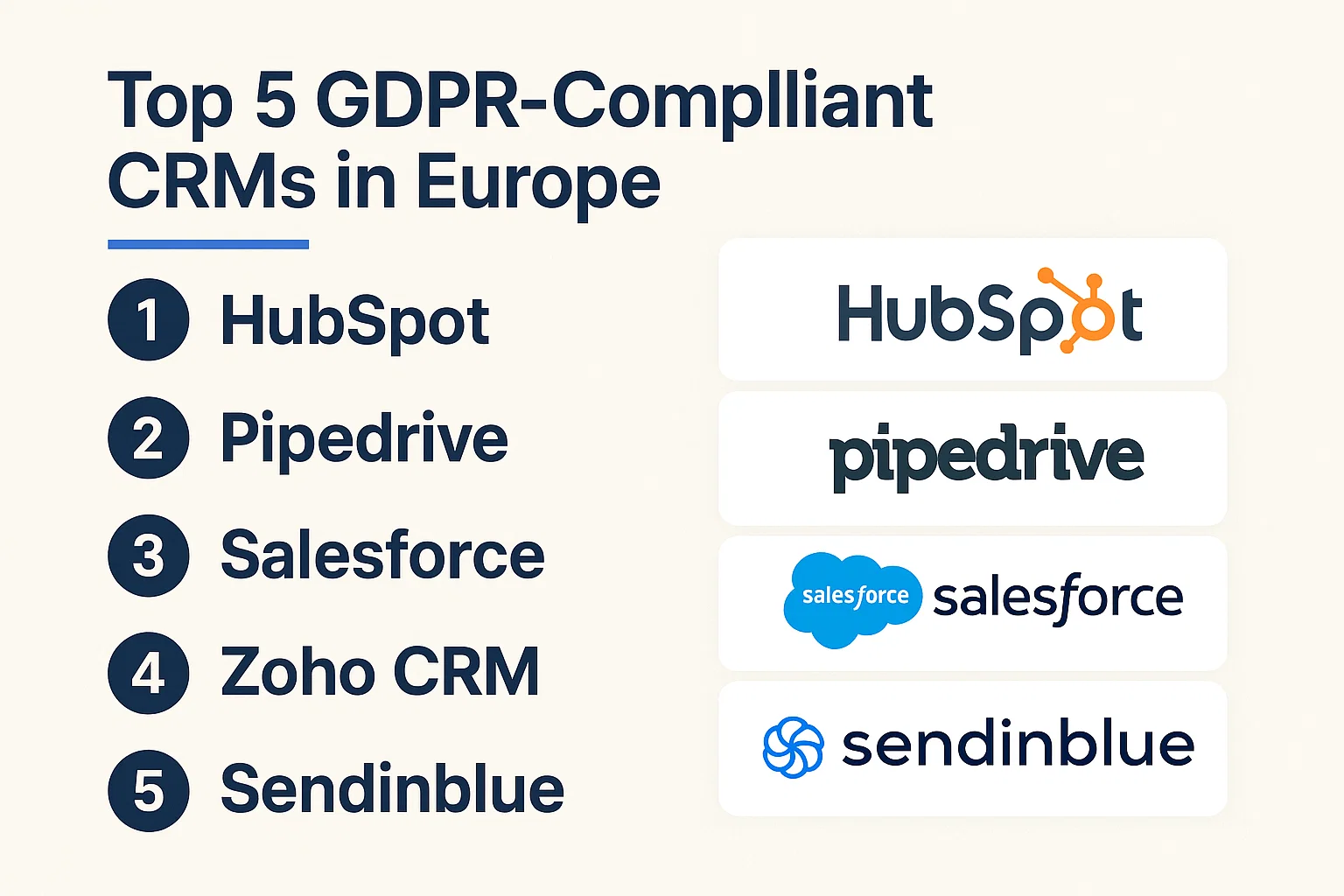Top 5 GDPR-Compliant CRMs in Europe

Top 5 GDPR-Compliant CRMs in Europe
With the implementation of GDPR (General Data Protection Regulation), European businesses must ensure that all customer data is securely stored and processed. Choosing a GDPR-compliant CRM is essential to avoid fines and maintain customer trust.
Why GDPR Compliance Matters for CRM Systems
CRMs store sensitive customer data, including contact information, transaction history, and communication logs. GDPR compliance ensures that:
- Customer data is collected and processed lawfully
- Users can access, modify, and request deletion of their data
- Data breaches are minimized with advanced security protocols
- Companies avoid penalties that can reach up to €20 million or 4% of annual revenue
Key Features to Look for in a GDPR-Compliant CRM
- Data encryption at rest and in transit
- Access controls and user permissions
- Audit trails for tracking data changes
- Consent management for marketing communications
- Automated tools for data export and deletion requests
- Integration with compliant marketing, billing, and support tools
Top 5 GDPR-Compliant CRM Platforms in Europe (2025)
| CRM Platform | Pricing | Best For | Key GDPR Features |
|---|---|---|---|
| HubSpot CRM | Free – $50/user/month | SMEs, marketing-focused teams | Data encryption, consent tracking, audit logs, EU data centers |
| Salesforce CRM | $25/user/month | Enterprises, scalable operations | Advanced encryption, privacy controls, GDPR reporting, EU hosting options |
| Zoho CRM Plus | $30/user/month | SMEs, multi-channel communication | Consent management, EU data residency, user access controls |
| Pipedrive | $14.90/user/month | Sales teams, startups | Data portability, audit trails, EU hosting |
| Freshsales CRM | $15/user/month | Customer success-focused teams | Consent tracking, data encryption, GDPR-compliant integrations |
Steps to Ensure GDPR Compliance in Your CRM
- Audit Your Data: Review all customer information and identify sensitive data.
- Choose the Right CRM: Select a platform with built-in GDPR compliance tools.
- Implement Access Controls: Restrict access based on roles and responsibilities.
- Obtain Clear Consent: Use consent forms and opt-in tracking for marketing communications.
- Set Up Automated Processes: Enable data deletion, anonymization, and export features for user requests.
- Monitor and Update Policies: Regularly review CRM settings to stay compliant with GDPR updates.
Benefits of GDPR-Compliant CRMs
- Enhanced customer trust and brand reputation
- Reduced risk of data breaches and fines
- Streamlined compliance reporting and audits
- Improved data management and efficiency
Tips to Maximize CRM ROI in Tier-1 European Markets
- Leverage automation for email campaigns while ensuring consent compliance
- Use integrated analytics to monitor customer engagement and retention
- Centralize all customer communication to reduce redundancy and errors
- Regularly clean your database to maintain data accuracy and quality
- Implement personalized workflows to improve conversion rates and customer satisfaction
Conclusion
Investing in a GDPR-compliant CRM is essential for European businesses. Not only does it protect sensitive data, but it also boosts customer trust and streamlines operations. Platforms like HubSpot, Salesforce, Zoho, Pipedrive, and Freshsales offer robust features, EU data hosting, and automation tools that help your business stay compliant and grow efficiently.
FAQs
1. What makes a CRM GDPR-compliant?
A GDPR-compliant CRM includes data encryption, consent management, EU data residency options, access controls, and audit trails.
2. Can small European businesses benefit from these CRMs?
Yes, even SMEs can leverage GDPR-compliant CRMs to manage contacts securely and maintain regulatory compliance.
3. Are there additional costs for GDPR features?
Some platforms include compliance tools in basic plans, while others may charge for advanced security, EU hosting, or audit reporting features.
4. How can I migrate data to a GDPR-compliant CRM?
Most platforms allow secure import via CSV, Excel, or direct migration from other CRM systems while maintaining compliance.
5. Do these CRMs work for global companies?
Yes, GDPR-compliant CRMs can also be configured for multi-region operations while meeting EU privacy standards.
Comments (3)